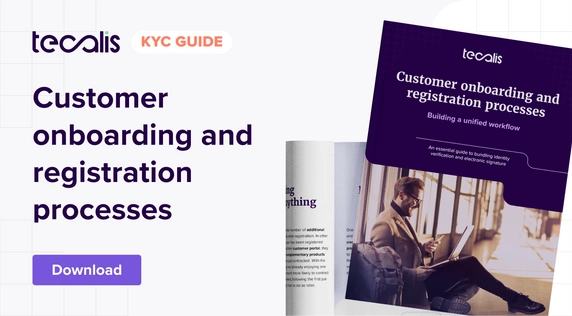Index
Get the latest news right in your inbox
Digital onboarding has become a crucial field in the transformation brought about by AI. However, along with increasing digitization, the risk of fraud is also on the rise, leading companies to look for more secure and efficient solutions.
With applications ranging from automated identity verification to personalization of experiences, AI not only accelerates these processes, but also reduces the risk of fraud and improves customer satisfaction. According to a PwC study, 72% of global companies see AI as a competitive advantage in improving their processes.
Digital Onboarding newest challenges
Since the arrival of the pandemic, the increase in online processes has been remarkable across all industries. According to McKinsey data, 90% of business-to-customer interactions are conducted digitally post-pandemic, and this trend is expected to continue to increase. This includes everything from opening bank accounts to contracting telecommunications or insurance services.
However, one of the biggest problems with digital onboarding is the abandonment rate. Studies reveal that up to 63% of users abandon the onboarding process if it is too long or complicated. Therefore, companies need to find ways to make these processes as streamlined and simple as possible.
AI as a unified solution
This is where AI comes in, a tool capable of automating tasks that previously relied on manual and tedious processes. From identity verification to service personalization, AI has the potential to reduce friction in the onboarding process while improving accuracy and security.
According to research firm Gartner, by 2025, organizations that implement AI in their onboarding processes will be able to reduce onboarding time by 30% and increase customer retention rates by 25%.

Identity Verification: Automation holding security and speed
One of the most crucial steps in digital onboarding is identity verification. This process is essential to ensure that the person completing the process is who they say they are. However, doing it manually can be complicated, time-consuming and error-prone.
In this context, AI has enabled companies to automate the verification of identity documents and perform this task in a matter of seconds. According to the Boston Consulting Group, more than 40% of banks and financial companies have already adopted AI solutions for identity verification, which has enabled them to reduce processing times by 50%.
AI identity verification is performed through a combination of computer vision algorithms and biometrics. These algorithms scan identity documents (such as passports, ID cards or driver's licenses, among many others) and compare them with official databases to verify their authenticity. They can also perform facial recognition to ensure that the person presenting the document is the same person who appears in the document's image.
Tecalis, a pioneer in this field, has developed advanced technologies that enable identity verification in less than 5 seconds. This is especially crucial in sectors where speed is key to customer retention, such as finance and telecommunications.

Fraud Prevention: AI to identify suspicious behaviors
Fraud is one of the biggest concerns in customer onboarding processes. In industries such as banking, digital fraud can generate multi-billion dollar losses. According to a report by Juniper Research, digital fraud will cost companies approximately $343 billion between 2023 and 2027. To mitigate this risk, companies are turning to AI as an effective solution.
The use of machine learning and behavioral analytics allows companies to identify unusual or suspicious behavior patterns that could indicate an attempt at fraud. These systems analyze data in real time and are able to detect behaviors such as:
- Repeated attempts to complete the process from different devices.
- Use of high-risk IP addresses.
- Discrepancies in the data provided, such as documents that do not match the official database.
Companies such as Tecalis and Datatons have implemented systems that, through a combination of computer vision and machine learning, are able to detect forged documents and suspicious behavior in real time. In addition, DataTons has collaborated with multiple companies to develop predictive models that not only identify potential fraud, but also anticipate when a customer is at risk of abandoning the onboarding process.
This type of fraud prevention is essential, especially for companies in the financial sector. According to Accenture, companies that implement AI in their fraud prevention processes can reduce fraud by 45% and save up to $3 billion annually.
Ad-hoc and customer-focused onboarding
Today, consumers expect personalized experiences in almost every aspect of their interaction with a company. According to recent reports, 70% of consumers indicate that personalized onboarding significantly increases their likelihood of using a product or service.
Financial industry impact
Imagine the case of a bank using AI to analyze customer behavior during the sign-up process. If a customer shows a particular interest in savings products, AI can automatically suggest personalized savings account options or investment plans based on their financial profile. This not only improves the customer experience, but also increases conversion rates by 30%, according to McKinsey data.
Companies like Amazon have led the way in personalization through AI, showing how recommendation algorithms not only increase sales, but also improve customer loyalty. According to a Harvard Business Review study, companies that personalize their services through AI can increase customer satisfaction by 25% and loyalty by 20%.
Application processing
Manually processing customer applications, especially in industries that require the review of large volumes of documents with anti-fraud controls, can be a slow and error-prone process. AI offers a solution to automate these tasks, improving speed and accuracy.
When registering a company (Know Your Business), it is common for multiple documents to be requested, such as company deeds or power of attorney. These documents are often lengthy and complex, which can make the manual review process extremely time consuming.
Using natural language processing (NLP) and computer vision and OCR algorithms, companies can automatically scan these documents, extract the relevant information and verify their validity in a matter of seconds. This not only speeds up the process, but also reduces errors that could arise in manual review.
In the case of one banking institution that implemented these solutions, the document processing time to register a company was reduced from several days to less than 30 minutes. In addition, the bank was able to detect potential fraud that might have gone undetected in a manual process.
Virtual Assistants and Chatbots: AI delivering the best UX
AI-based chatbots and virtual assistants are revolutionizing the way companies interact with their customers during the onboarding process. These assistants can answer questions, guide users through the different steps of the process and solve problems in real time, all without the intervention of a human agent.
One of the biggest challenges in digital onboarding is the friction users experience when they don't understand a step in the process or have difficulty completing a task. A chatbot can detect when a user is having trouble and offer instant help in the form of voiceovers and guides, reducing abandonment rates.
In telecommunications industry, a virtual assistant can detect that a user is taking too long to complete a specific field (such as an ID number) and offer assistance to guide them through the process. According to a Zendesk study, chatbots can increase onboarding completion rates by 20%.
One of the advantages of AI-based chatbots is that they continuously learn from interactions with users. This means that the more they are used, the more accurate they become in detecting problems and offering customized solutions.
AI as a key strategy in BFSI and any industry
The implementation of AI in digital onboarding has proven to be an invaluable tool for companies looking to improve efficiency, reduce costs and deliver a superior user experience. From identity verification to service personalization and fraud prevention, the applications of AI are diverse and powerful.

However, the successful implementation of these technologies depends on a well-defined strategy and the proper use of AI tools. Companies should identify which areas of their onboarding process need further optimization and work with AI experts to develop customized solutions that fit their needs.
In short, AI is not just a fad in digital onboarding, but a solution that is here to stay, providing companies with a crucial competitive advantage in an increasingly digitized marketplace.
























